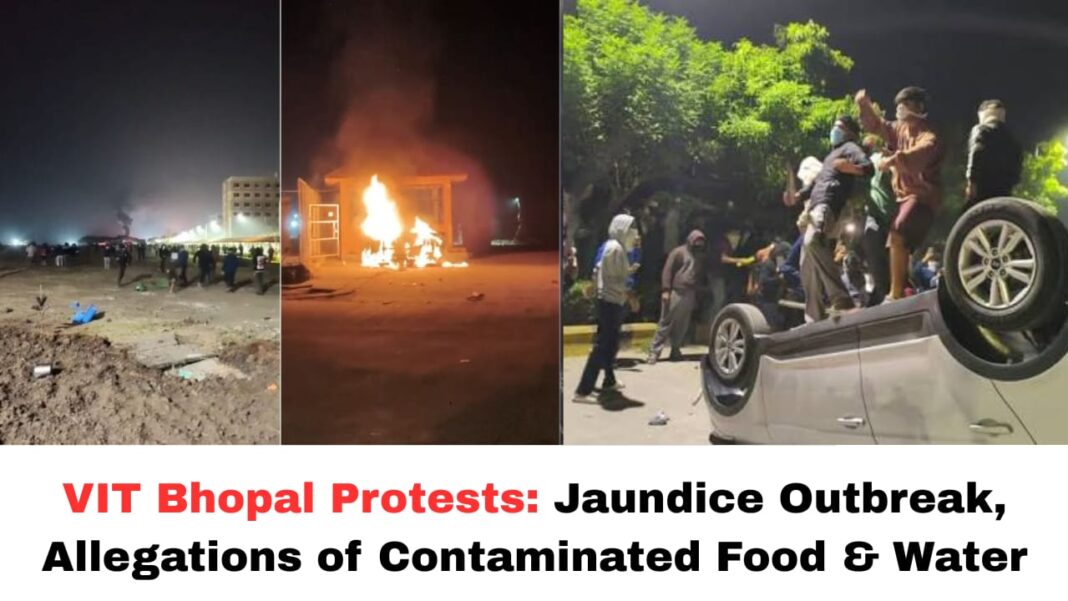Digital News Guru Madhya Pradesh Desk:
VIT Bhopal Rocked by Violent Protests After Jaundice Outbreak
On the night of November 25–26, 2025, a large-scale protest erupted at VIT Bhopal’s campus in Sehore district, Madhya Pradesh. The trigger: a suspected outbreak of Jaundice among students — allegedly caused by poor hygiene, substandard food, and contaminated drinking water in hostels and mess facilities.
Reports say as many as 4,000 students gathered during the protest. Frustrated by what they described as repeated dismissals of their health complaints by campus authorities, students raised slogans and soon escalated to damaging and torching property — including buses, cars, bikes, and reportedly even the bungalow of the university’s chancellor.

What the Students Say: Complaints, Illness & Allegations
Students allege that over the past few weeks, an increasing number of hostellers fell ill with jaundice-like symptoms, following consumption of what they claim was contaminated food and water. The grievances reportedly began with informal complaints, but as these were ignored, anger built up.
One core accusation from the students: that when they tried to raise the issue with hostel or mess staff — or campus security — their concerns were dismissed or even met with hostility. Some students claimed they faced threats or physical intimidation from security guards when trying to draw attention to the problem.
As per the students, many were forced to rely on bottled water because campus drinking water was unsafe. Complaints extended to poor sanitation in dormitories and unhygienic mess conditions.
What Administration and Authorities Are Saying
Officials from the institute and district administration have denied reports of any death on campus due to the alleged jaundice outbreak. According to a statement from the registrar, KK Nair, 22 students (1 girl and 21-22 boys) had tested positive or had preliminary symptoms of jaundice as of November 26, and they were recovering after being sent home.
Health authorities reportedly inspected the campus between November 23 and 25 — checking sanitation practices, water supply, and food-preparation facilities. The inspection teams have, per some reports, said that they found no major hygiene violations.
Despite denials of fatalities, the administration’s inability (as claimed by students) to promptly address repeated complaints about water and food quality appears to have triggered the protest. The uncertainty, distrust and panic seem to have snowballed into violent unrest.
In response to the violence, the university has declared a holiday until November 30, 2025, and the campus has been closed for the interim while investigations continue. Police and paramilitary forces have been deployed to ensure safety and maintain order.

The Protest Night: Chaos and Destruction
According to multiple media reports:
- After midnight on Tuesday, a large number of students assembled near hostels, shouting slogans against the administration. The protest soon spiraled into property damage and arson.
- Several vehicles — including a university bus, cars, motorcycles and even an ambulance — were set on fire. Windows were broken, and parts of campus infrastructure, including mess and hostel blocks, reportedly suffered damage.
- Students also reportedly vandalised the residence of the chancellor / top university authority, intensifying the protest.
- In response, police forces from five regional stations were called in, and a heavy deployment was made to control the situation. By early Wednesday morning, the campus was placed under lockdown and students began leaving.
Authorities now plan a probe into the root cause of the outbreak, alleged negligence, food-water safety, and the incidents of violence. Meanwhile, campus life has been put on hold until further notice.
Broader Implications: Student Safety, Infrastructure & Accountability
The events at VIT Bhopal raise serious questions about student safety, the adequacy of campus infrastructure, and accountability of educational institutions — especially those charging hefty fees. Students’ core complaint isn’t just illness: it’s alleged neglect, repeated dismissal of legitimate concerns, and — as they claim — oppressive reaction to their pleas.
In a country where student dormitories and residential institutions house thousands, the situation underscores the need for stricter hygiene, regular inspections, transparent grievance mechanisms and accountability. College administrations and local authorities may need to ensure swift remedial action — not just damage-control after protests.
Especially worrying are claims by students (echoed anonymously on social media) of even possible deaths due to the outbreak — though these remain unverified and denied by official sources. The call for impartial, thorough investigation — and free access to medical care for affected students — becomes even more urgent.
The incident might force other institutions across India to re-examine hygiene, water supply and food safety standards in hostels and mess facilities, particularly in residential campuses.

What’s Next: Investigation, Student Health & Campus Stability
As of now:
- The campus of VIT Bhopal remains closed until November 30, 2025.
- Police, district health and administrative authorities are expected to conduct a full inquiry into the cause of the jaundice outbreak, the allegations of contaminated food/water, assessment of infrastructure and hygiene standards, and also the circumstances leading to violence and arson.
- The university administration has insisted there have been no deaths, and that the reported 22–odd jaundice cases are under control — but many students remain skeptical, demanding transparency and accountability.
- Meanwhile, affected students and their families might call for wider reforms in campus hygiene, water safety, and institutional governance — beyond just crisis management.
Final Thoughts
The outbreak and subsequent violence at VIT Bhopal represent more than a campus conflict — they reflect the fragile trust between students and administration when basic amenities and safety are perceived to be compromised.
As an educational institution and community, VIT Bhopal now stands at a crossroads: will it merely repair property and resume classes after the break — or will it earnestly address the root causes, ensure transparency, and rebuild students’ trust in safety, health and welfare?
For students across India, the incident is a warning: campus life must not come at the cost of basic rights — clean water, safe food, sanitation, dignity. Institutions and authorities must ensure that promise is not broken.
You May Also Read: Supreme Court Orders Nationwide Audit of Private Universities








